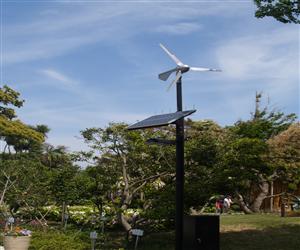It covers the basics of electricity, how to generate electricity from renewable resources, how to store energy, non electrical systems, energy consumption and conservation. Learn to understand why alternative and renewable energy is so important and how to go about it.
 There are 8 lessons in this course:
There are 8 lessons in this course:
Before installing any alternative energy system such as solar panels, it is advised to first minimise energy consumption where possible, this will save an enormous amount of energy that needs to be produced. This can be achieved by passive solar house design, installation of insulation, running appliances correctly and other means. Here is a brief list of just some of things a householder can do to reduce energy consumption:
-
Buy energy-efficient appliances. When shopping for a new appliance - especially a major appliance such as a refrigerator, dishwasher, or air-conditioner - select the one with the highest energy efficiency rating.
-
Practice fuel-efficient driving - Every gallon of gasoline burned puts 26 pounds of carbon dioxide into the atmosphere. You can boost the fuel-efficiency of your car by 30% by simple vehicle maintenance and attention to your style of driving.
-
Buy a fuel-efficient car. A little more extreme but will save you money in the long-run.
-
Drive less - You'll save energy by taking the bus, riding a bike, or walking. Or car-pool.
-
Recycle whenever possible - aluminium cans, newspapers, magazines, cardboard, glass - anything recycled reduces the energy needed to create new products.
-
Eat locally produced food. Food transportation is one of the fastest growing sources of greenhouse gas emissions.
-
Paint your home a light colour if you live in a warm climate, or a dark colour in a cold climate. This can contribute saving up to 5000 pounds of carbon dioxide per year.
-
Choose clean energy options - If you can choose your electricity supplier, pick a company that generates at least half its power from wind, solar energy and other renewable sources.
-
Wear warm clothing, instead of turning the heater up in winter.
-
Keep door closed if you're not using those rooms (don't heat rooms not in use).
-
Minimize opening door on a hot day (don't let the house warm up so easily).
-
Install insulation.
-
Turn the heating down at night and use more blankets.
-
Metallic paint on a radiator acts as an insulator, preventing maximum heat exchange into a room.
-
Keep heating and cooling units clean and well serviced.
-
Don't use ceiling exhaust fans any longer than necessary, as they suck hot or cold air from a room.
-
Landscape for fuel efficiency (eg: Shade trees minimize temperature fluctuations....they insulate in summer against heat and against cold in winter). Windbreaks can deflect prevailing winds.
-
Colours in the house affect temperature absorption both in real terms and psychologically. Cool colours make you feel cooler (eg: blue). Hot colours (eg: red), make you feel hotter. Dark colours absorb heat, light colours reflect more heat.
-
Carpet helps insulate houses in cool areas, in hot areas use tiles.
-
Arrange furniture so it doesn't restrict flow of warmth or coolness from heaters or air conditioners.
-
Consider solar hot water systems as opposed to electricity.
-
Turn lights off when not in the particular room.
-
Use energy efficient light bulbs instead of common incandescent bulbs.
-
Convert power connection to "Night Rate Off Peak" or other saving limits.
-
Reduce use of appliances with either heaters or moving components as they use more electricity on average.